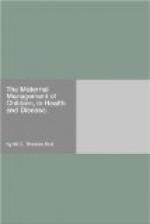[FN#15] Marcellin relates an instance of seven children in a family whose bowels became infested with worms, from the use of stimulants. They were cured by substituting water for the pernicious beverage.
In this town, spirits, particularly gin, are given to infants and children to a frightful extent. I have seen an old Irish woman give diluted spirits to the infant just born. A short time since one of those dram-drinking children, about eight years of age, was brought into one of our hospitals. The attendants, from its emaciated appearance, considered the child was dying from mere starvation; which was true enough in a certain sense. Food was accordingly offered and pressed upon it, but the boy would not even put it to his lips. The next day it was discovered that the mother brought the child very nearly a pint of gin, every drop of which before night he had consumed.
It is easy to discover when children have been fed upon spirits: they are always emaciated; have a lean, yellow, haggard look: the eyes sunk, the lips pale, and the teeth discoloured, the cadaverous aspect of the countenance being most fearful. They are continually suffering from bowel complaints and convulsive disorders; which, under these circumstances, terminate invariably in an early death.
Sect. IV. Sleep.
During infancy.—For three or four weeks after birth the infant sleeps more or less, day and night, only waking to satisfy the demands of hunger; at the expiration of this time, however, each interval of wakefulness grows longer, so that it sleeps less frequently, but for longer periods at a time.
This disposition to repose in the early weeks of the infant’s life must not be interfered with; but this period having expired, great care is necessary to induce regularity in its hours of sleep, otherwise too much will be taken in the day-time, and restless and disturbed nights will follow. The child should be brought into the habit of sleeping in the middle of the day, before its dinner, and for about two hours, more or less. If put to rest at a later period of the day, it will invariably cause a bad night.
At first the infant should sleep with its parent. The low temperature of its body, and its small power of generating heat, render this necessary. If it should happen, however, that the child has disturbed and restless nights, it must immediately be removed to the bed and care of another female, to be brought to its mother at an early hour in the morning, for the purpose of being nursed. This is necessary for the preservation of the mother’s health, which through sleepless nights would of course be soon deranged, and the infant would also suffer from the influence which such deranged health would have upon the milk.




